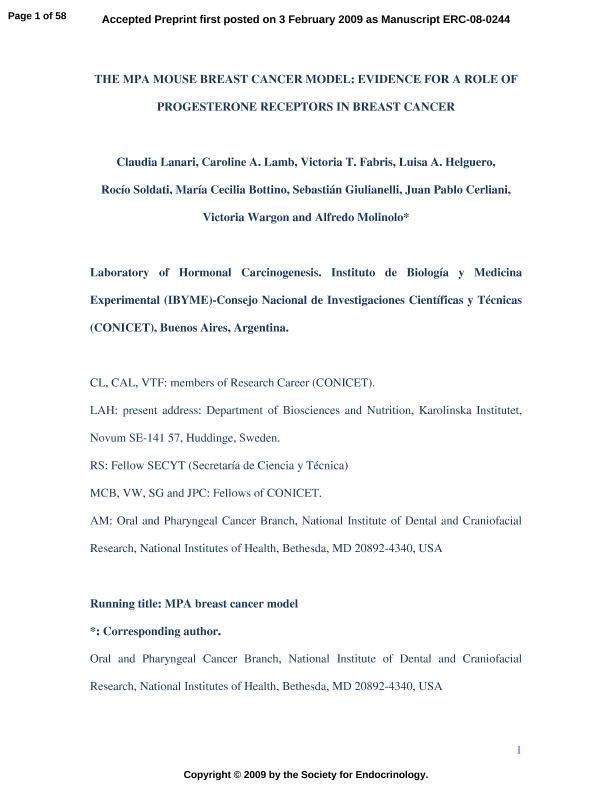Artículo
The MPA mouse breast cancer model: evidence for a role of progesterone receptors in breast cancer
Lanari, Claudia Lee Malvina ; Lamb, Caroline Ana
; Lamb, Caroline Ana ; Fabris, Victoria Teresa
; Fabris, Victoria Teresa ; Helguero, Luisa A.; Soldati, Rocío; Bottino, Maria Cecilia
; Helguero, Luisa A.; Soldati, Rocío; Bottino, Maria Cecilia ; Giulianelli, Sebastian Jesus
; Giulianelli, Sebastian Jesus ; Cerliani, Juan Pablo
; Cerliani, Juan Pablo ; Wargon, Victoria
; Wargon, Victoria ; Molinolo, Alfredo
; Molinolo, Alfredo
 ; Lamb, Caroline Ana
; Lamb, Caroline Ana ; Fabris, Victoria Teresa
; Fabris, Victoria Teresa ; Helguero, Luisa A.; Soldati, Rocío; Bottino, Maria Cecilia
; Helguero, Luisa A.; Soldati, Rocío; Bottino, Maria Cecilia ; Giulianelli, Sebastian Jesus
; Giulianelli, Sebastian Jesus ; Cerliani, Juan Pablo
; Cerliani, Juan Pablo ; Wargon, Victoria
; Wargon, Victoria ; Molinolo, Alfredo
; Molinolo, Alfredo
Fecha de publicación:
01/06/2009
Editorial:
BioScientifica
Revista:
Endocrine - Related Cancer
ISSN:
1351-0088
e-ISSN:
1479-6821
Idioma:
Inglés
Tipo de recurso:
Artículo publicado
Clasificación temática:
Resumen
More than 60% of all breast neoplasias are ductal carcinomas expressing estrogen (ER) and progesterone receptors (PR). In contrast, most of the spontaneous, chemically or MMTV induced tumors, as well as tumors arising in genetically modified mice do not express hormone receptors. We developed a model of breast cancer in which the administration of medroxyprogesterone acetate (MPA) to BALB/c female mice induces mammary ductal carcinomas with a mean latency of 52 weeks and an incidence of about 80%. These tumors are hormone-dependent, metastatic, express both ER and PR, and are maintained by syngeneic transplants. The model has been further refined to include mammary carcinomas that evolve through different stages of hormone dependency, as well as several hormone-responsive cell lines. In this review, we describe the main features of this tumor model, highlighting the role of PR as a trigger of key signaling pathways mediating tumor growth. In addition, we discussthe relevance of this model in comparison with other currently used breast cancer models pointing out its advantages and limitations and how, this model may be suitable to unravel key questions in breast cancer.
Archivos asociados
Licencia
Identificadores
Colecciones
Articulos(IBYME)
Articulos de INST.DE BIOLOGIA Y MEDICINA EXPERIMENTAL (I)
Articulos de INST.DE BIOLOGIA Y MEDICINA EXPERIMENTAL (I)
Articulos(IIBBA)
Articulos de INST.DE INVEST.BIOQUIMICAS DE BS.AS(I)
Articulos de INST.DE INVEST.BIOQUIMICAS DE BS.AS(I)
Citación
Lanari, Claudia Lee Malvina; Lamb, Caroline Ana; Fabris, Victoria Teresa; Helguero, Luisa A.; Soldati, Rocío; et al.; The MPA mouse breast cancer model: evidence for a role of progesterone receptors in breast cancer; BioScientifica; Endocrine - Related Cancer; 16; 2; 01-6-2009; 333-350
Compartir
Altmétricas



